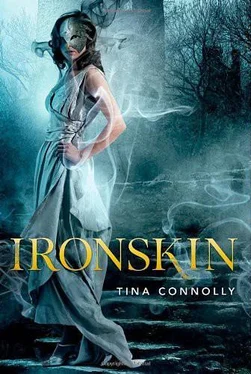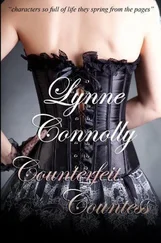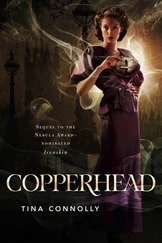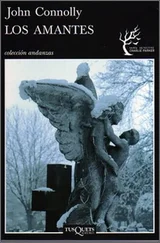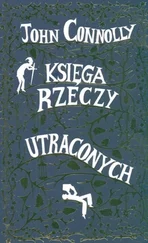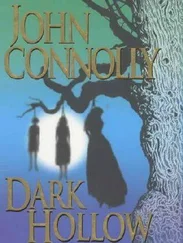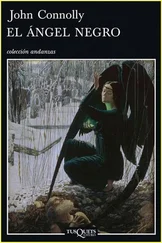“No parties,” said Jane. “You’ve had a much harder time fitting in than you let on.”
“It was fine at first,” said Helen, still looking at the voile of her skirts. “But they closed off against me. You weren’t here, Jane. I did hardly anything, but this girl Annabella took a dislike to me. She had wanted Alistair, you see—even with his drink and horses and cards and all that. She started slyly putting me down at every turn, and her friends had to choose her over me—and she has a great many friends.” Her hand touched her jaw in a now-familiar gesture, that moment of touching where you and the mask met. “I needed something to trump her. Your Edward was so kind.”
With effort, Jane let that comment fall away like water against an oiled coat, did not let it touch her. “The masks are a problem,” she said.
“You have one. Hardly fair to accuse me of—oh, I don’t know, whatever you were going to accuse me of. Vanity? Self-indulgence? You try being the younger sister to someone who always has the moral high ground.”
Jane burst out: “But you were there for Mother! Don’t you know how I’ve regretted that?” Charlie and her mother, the two old guilts twined together.
Helen looked sideways at Jane, fingers opening and closing on her skirts. “Jane,” she said, pleading. “You don’t know how it was.…”
There was a sudden softness to the mask—was this a way back into understanding, after all? Jane groped for words.
But she could not find them quickly enough. Helen’s face fell; she turned away and muttered to herself, “I suppose you can’t expect an ironskin to understand what it’s like, being thrown to the wolves with nothing but your face, nothing but your face, nothing.”
Jane’s blood ran cold as Helen dismissed her as ironskin. Helen had remade herself in the city, with or without the new face. Jane tabled the danger of the masks for a moment and tried a different tack. “Helen,” she said. “The mask … it’s almost like it gives me more power. Like … a fey.”
“Fey beauty, not fey itself,” said Helen. Nervous laugh. “Don’t be so paranoid.”
“Hear me out for once. Accept that I know things.”
Helen looked around at the empty parlor, dressed up with vases of early roses for the evening’s event. “If I tell you … don’t tell, oh, she wouldn’t tell, would she, but, you see. There is something different since I got this. Like the walls are pushing in, don’t you remember, doesn’t she remember that?” Her sentences muddled back and forth as she worked herself up, as if Jane were hearing spoken words and internal thoughts all tangled together.
“No. Tell me.” Jane remembered Nina saying of Blanche Ingel “jumpy as a cat since the surgery,” remembered poor Nina’s lost and hollowed-out face. She felt much more tenderly about attacked Nina than she ever had about Nina alive.
“I hear things chittering,” said Helen. “Like something is around me. Everywhere, just out of sight.” She nodded around the room. “Behind that hideous painting of Alistair’s mother, or under the piano there, or slithering under the green baize on the card table. Or that blue—oh, why would Alistair taunt me with that fey-blue pillow!” In hectic, feverish motions Helen seized the pillow and buried it underneath the sofa, out of sight. Sank back to her seat.
Silence from shocked Jane, and Helen rushed on:
“Tell me you feel it, too.”
“No…,” said Jane. “Not except for a brief moment when I first awoke.”
“You think I’m mad, I know she does think it,” said Helen. “All the same, I remember you after the war sometimes. That was quite different, but sometimes … that’s how I feel.”
And suddenly Jane remembered five years ago, remembered waking up with her cursed cheek at home, in her bed. “The striped wallpaper swimming in to meet me,” she said. “Everything had a voice, and it was all after me. And everything Mother did seemed amplified tenfold—her endless weeping. Her anger at me for losing Charlie.” Sharp the memories came—she had known that anger though Mother had tried to hide it; she had fled from it. Yet it had twisted inside her, and taken root, and grown.…
“It’s mad, isn’t it?” said Helen, suddenly sharp and direct. “And yet that’s what I think of. You, before you left us, the way you seemed then. And yet my face is not a curse—oh, Jane, tell me what I’ve done.”
Jane took Helen’s hands. “I tried to seal off my curse and that didn’t work. I peeled off the iron and started to work with it. I gained power with it, and now with this mask I have even more. You can do that. You must do that. You have to learn to be strong and fight with what you wear, or … the fey will take you over … alive.” The thought sparked a vivid memory of crouching inside the door that morning while the Fey Queen attacked poor Nina.
Helen jerked away, was suddenly up behind her chair. Her saucer of tea clattered to the floor and broke amber across the patterned rug. “It’s them, isn’t it. It’s them I hear crackling through the walls. They’re coming, they’re coming—”
“Be calm!” said Jane. “Yes, they are a danger, but you can learn to fight it. You and all your friends, you must try. We have fey in our bodies now, and we can learn to use it to defend ourselves, or we can be victims.”
Helen sneered at Jane. “Then you’ve made yourself in danger, too, haven’t you? Bet she’s sorry now, wouldn’t she rather be ugly and safe—”
“But I wasn’t safe,” said Jane. “I had it all along.” And suddenly she thought of all those ironskin who were also in danger. She would have to get to Niklas and let him know. And Dorie—she had to find out what had happened to her little girl. There was too much to do to hide in Helen’s house another minute.
She stood, gathering her skirts and wits, and said with some asperity to Helen, crouching behind the chair, “Oh, buck up.”
The butler swept in, then, with Gertrude behind him. Triumph from Gertrude: “There, I knew you’d upset her! You don’t understand what she needs—”
The butler ignored the drama and said: “A visitor to see you, Miss Eliot. A Miss Poule.”
* * *
Poule drove them through the city in Edward’s old car, calmly maneuvering around the horses and holes that clogged the streets, the farther they got from Helen and Alistair’s part of town.
“They can get into fey substance,” said Poule. “All that is fey substance.”
“Yes,” said Jane, for it was what she’d figured out. “Tell me—is Dorie all right?”
Poule shook her head. “Every time I thought I saw her, she vanished. No telling whether that’s Dorie.…” Or something in Dorie, she did not say.
Jane’s heart twisted, thinking about it. Perhaps she should have grabbed the little girl, stolen her away. She could be here right now, safe on Jane’s lap.
“You’re no safer here than in the country,” said Poule.
“You’ve said as much,” said Jane.
“What I don’t understand,” said Poule, “is that they could’ve taken you, or any of the ironskin over at any time. They didn’t have to wait for Edward to put on the masks.”
“They could,” said Jane. She had been thinking about the moment in the clearing, when the fey had seemed to invade and reject her. “But they wouldn’t take over ironskin, unless that was the only option. They’re drawn to beauty. I was practically unclean to them.”
“Huh,” said Poule. “A thousand centuries of trade with them, and yet I’ll never understand the blasted things, I guess.”
“But what is fey substance?” said Jane. “The curses, the bluepacks—are they the same? Is it like spider silk?”
Читать дальше
